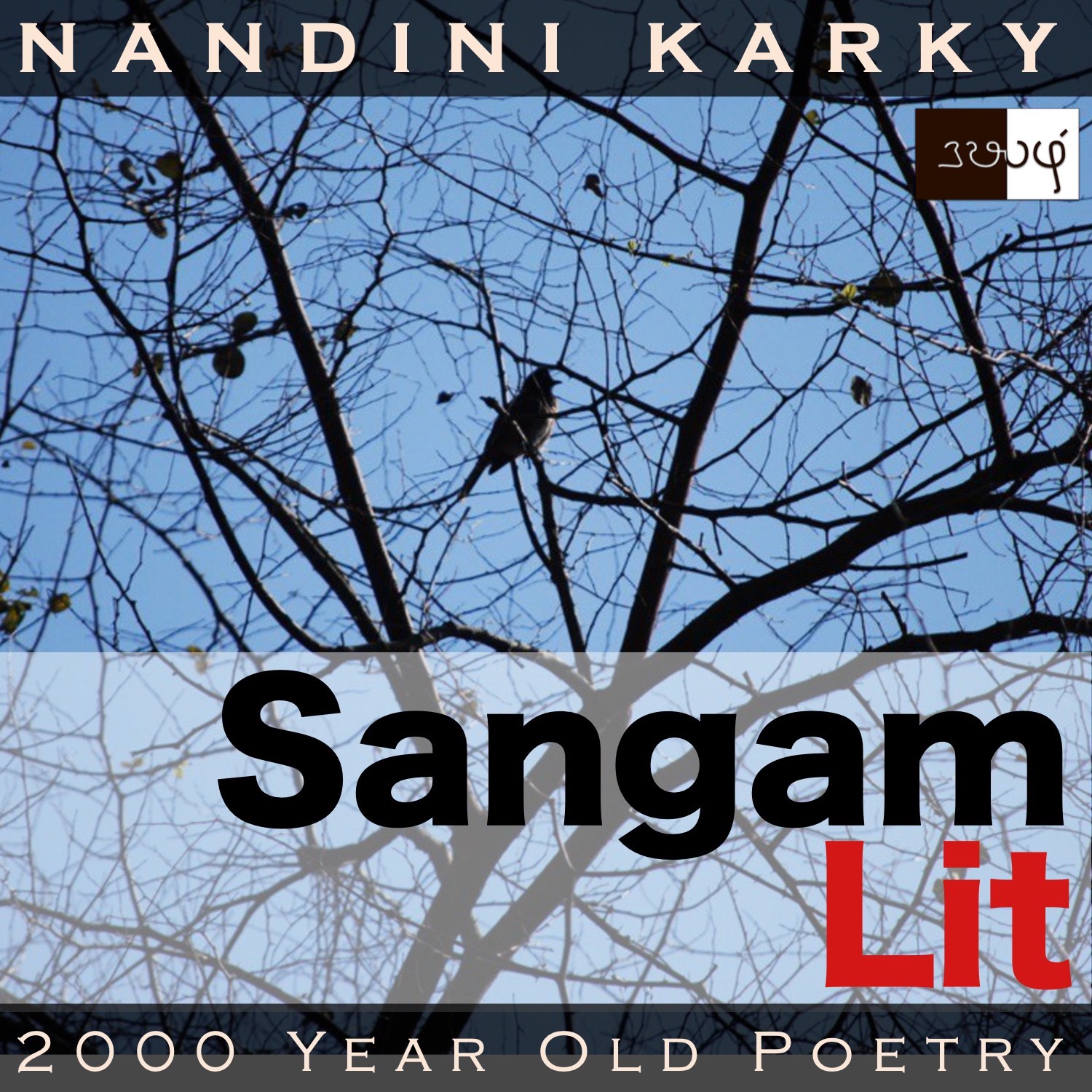Podcast: Play in new window | Download
Subscribe: Apple Podcasts | Spotify | Amazon Music | Android | iHeartRadio | TuneIn | RSS | More

In this episode, we perceive a mother’s worry about her daughter, as portrayed in Sangam Literary work, Natrinai 305, penned by Kayamanaar. The verse is situated in the drylands of ‘Paalai’ and speaks in the voice of the mother to the lady’s confidante, expressing how she misses her daughter, who has eloped away with the man.
வரி அணி பந்தும், வாடிய வயலையும்,
மயில் அடி அன்ன மாக் குரல் நொச்சியும்,
கடியுடை வியல் நகர் காண் வரத் தோன்ற,
தமியே கண்ட தண்டலையும் தெறுவர,
நோய் ஆகின்றே-மகளை!-நின் தோழி,
எரி சினம் தணிந்த இலை இல் அம் சினை
வரிப் புறப் புறவின் புலம்பு கொள் தெள் விளி,
உருப்பு அவிர் அமையத்து, அமர்ப்பனள் நோக்கி,
இலங்கு இலை வெள் வேல் விடலையை
விலங்கு மலை ஆர் இடை நலியும்கொல் எனவே.
The verse opens with ‘வரி அணி பந்தும்’ talking about ‘a ball etched with lines’, most probably a ball made by rolling thread, used for play in Sangam times. Curiously, this poet, who seems to specialise on the theme of ‘elopement’ mentions one such ball in most of his poems. Proceeding further, we glance at the ‘வயலை’, which is a creeper known as ‘பசலை’ or ‘Malabar spinach’ today. The phrase ‘மயில் அடி அன்ன மாக் குரல் நொச்சியும்’ talks about the ‘chaste tree with its dark-hued flowers and leaves that look like a peacock’s feet’, an expression we have already encountered in Natrinai 115. ‘இலங்கு இலை வெள் வேல் விடலையை’ is a phrase-portrait of ‘a young man who holds a victorious spear that has a leaf-shaped tip’. Note how the word ‘விடலை’ in this verse, is used to refer to a male in the age group of 16-25 today, and in addition, ‘விடலைப் பருவம்’ characterises the period of adolescence, when childhood is left behind and the transition to adulthood is on its way. Ending with ‘நலியும்கொல் எனவே’ meaning ‘thinking about the trouble therein’, the verse beckons us to listen with empathy!
The man and lady had been leading a love relationship when they realised that strangers were seeking the lady’s hand in marriage. When the man decides to claim the lady’s hand, he understands that his request may not be entertained by the lady’s parents. In order to preserve the chastity of their relationship, the man and lady elope away to the man’s village. One morning, after this incident, the mother turns to the lady’s confidante and says, “Whenever I glimpse at that ball decorated with lines, the dried-up ‘vayalai’ creepers and the dark-flowered ‘gnochi’ shrub with leaves akin to a peacock’s feet in this well-protected, expansive mansion, or when I see the distressing orchard that is all alone, I’m filled with suffering, my girl! I worry that on hearing the loneliness-filled, clear call of a pigeon with a lined back that sits on a branch of a tree, shorn of its leaves by the rage of the sun, during that time when heat blazes in that path blocked by mountains, your friend would turn with a war-like gaze at the young man with a leaf-tipped, victorious spear and trouble him endlessly.” With these words, the mother expresses the innocence of her daughter and her worry about how she would face the dangers in her journey with the man.
Now, let’s explore the nuances! The lady’s mother takes us for a tour around her well-protected mansion, pointing to a ball lying about listlessly, then to ‘vayalai’ creepers growing around the house, looking withered, and then to the shade of the ‘gnochi’ tree with its leaves like that of a peacock’s feet. If you google an image of a peacock’s feet and a chaste tree’s leaves, you will be stunned by the similarity! Indeed, seeing echoes of the plant world in the animal kingdom and vice versa is a unique talent of the Sangam folks! Returning to the verse, the mother is showing these elements to us, to tell us her heart aches thinking of how her child used to play with that ball in the shade of that chaste tree and pluck flowers and leaves from the creeper. Then, she turns to the lady’s confidante and calls her ‘daughter’. Magnificent is the heart of a mother who can see her daughter’s friend as her own daughter! To this girl, mother expresses a worry nagging her heart amidst all the suffering of missing her child.
From that mansion, mother transports us to a drylands path, where hot winds blow through. When we look around, we spot a tree, bereft of leaves, which have been stolen away by the sun’s ire. On this tree, on a dried-up branch, sits a pigeon and sends out a coo. From the pigeon, the mother points to her daughter walking that path and says, on hearing this, she is sure to turn with blazing eyes at the man, who walks with a spear in his hand, and trouble him with questions endlessly. The mother finishes saying that she worries for the struggles the man would face, taking her naive daughter on this difficult mission. The poem highlights how to a mother, her child is always the helpless, naive person, who needs to be cared for. Indeed, human babies are dependant on this maternal instinct to thrive. Without this feeling, there would be no human race, for our young are utterly dependant on the love and care of those around them. This feeling lives on for long and now brings suffering in the case of this mother, who cannot let her daughter go, and still worries about how she will fare and what troubles she will bring to her companion, who has taken her away. A classic case of how the fountainhead of our strength can be that of our weakness too!




Share your thoughts...